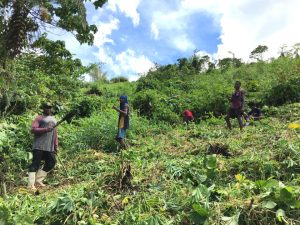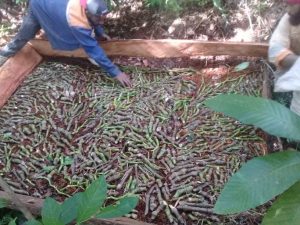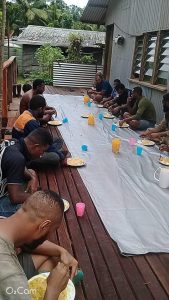Conservation through Youth Groups during the Pandemic
By: Taitusi Dradra, Community Engagement Officer, Pacific Blue Foundation (and Serua Island youth group secretary).
Conservation is a way of protecting the environment and the natural resources within. Natural resources are those commodities that are considered valuable in their natural form. In every traditional community the people value the natural resources because they are privileged to be born with a traditional ownership of them.

However, the abundance of these resources in traditionally owned lands and waters, have been slowly diminishing in the forms of decreased fish stocks, loss of primary forests and with this the traditions and cultures which are greatly affecting the lives of every community in Fiji and the Pacific. Due to many difficult situations faced by communities during the recent era of the COVID-19 pandemic that was brought to the doors of every community, people have lost their jobs and struggle to find alternative ways to support their livelihood, thus leading in many places to the over-exploitation of the natural resources.
Youths make up the majority of Fiji’s population, thus making them the main group whom utilize and, in many cases, over-exploit natural resources. Most of whom that reside in the urban areas have recently lost their jobs due to the pandemic, and later on moved back to their respective communities in a rural or maritime location. As a result, in many cases, they have become dependent on the natural resources for food and as their sources of income.

From my experience, after attending several National Youth workshops, majority of youths in Fiji lack the knowledge about how valuable and important the environment is and the risk of not conserving natural resources. Many think of what will benefit them today and not what will be left for their grandchildren to enjoy in the future. For instance, most young farmers don’t weed their plantation, they apply toxic weedicides to kill weeds faster than normal weeding activities as practiced by our forefathers; jeopardising not only the soil but the environment as a whole.

When excessive chemicals are applied to the soil, they are flushed down into the creeks and rivers and into the ocean by the rain. As a result, algal growth develops in the river and in the ocean. Mother Nature that was once so rich is now continuously degraded due to human activities. Regardless, people continue to over-exploit the environment in such degrading activities and practices.
This has left me to question myself, what will happen to future generations if we leave no resources for them to enjoy? What would they say? Who will they blame? Will they blame Mother Nature?
Can we still make a change to protect ourselves and the environment from this crisis?
The answer is Yes-we can!
During the last year, sustainable and conservation activities have been practiced by the Serua Island Youth group, operating through communal activities. We banned the use of weedicides among the youths and the use of inorganic fertilizers. With time, the local community members had noticed that it does not only conserve the environment but home-grown foods are richer in taste.
Most coastal and especially small island communities such as Beqa, Yanuca and Serua Islands, are highly dependent on the sea and land for their livelihood. I have given myself hope in working very closely with youth groups as they are true warriors of Beqa Lagoon by putting food on the table for their families. There is a need to empower youths to conserve the natural environment. Not in only educating them but also to assist in the implementation and enforcement of management strategies in the effort of natural resource conservation.
By changing their mindsets and behavior towards the environment than we can together achieve sustainability of our natural resources, for the present and the future.



